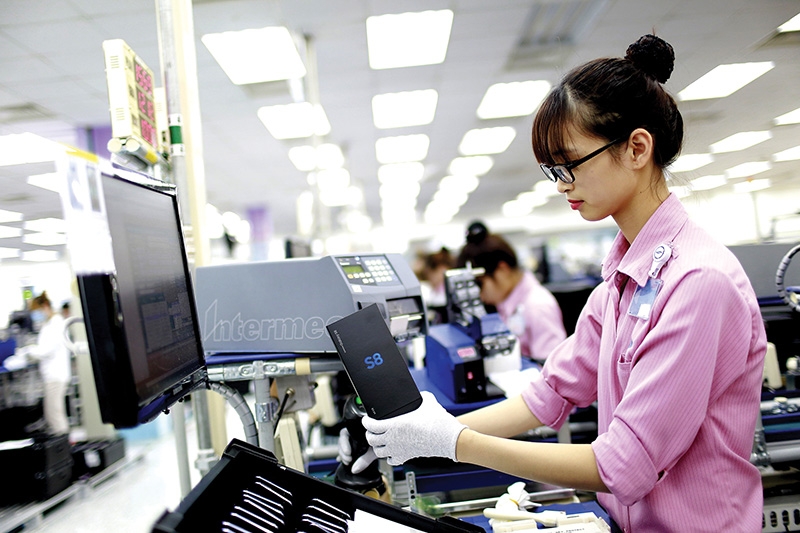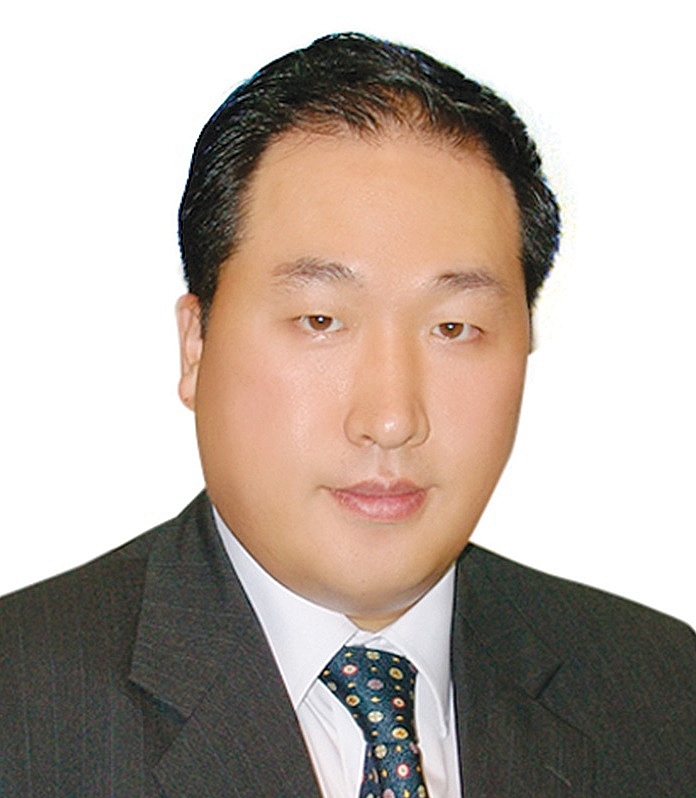Opening the doors for South Korean investors
 |
| As a global tech hub, South Korea brings a wealth of expertise which Vietnam is utilising across several sectors Photo: Le Toan |
South Korean investment in Vietnam has increased significantly on a more sustainable tract in all fields, not only in economics but also in society, culture, education, and science and technology since Vietnam and South Korea established diplomatic ties in 1992.
 |
| Hong Sun, vice chairman of the Korea Chamber of Business in Vietnam |
One of the highlights of South Korean investment in Vietnam in 2019 was the promotion of the government’s New Southern Policy (NSP), and the contributions of South Korean firms to Vietnam’s digital transformation. Important events included Prime Minister Nguyen Xuan Phuc’s attendance at the 2019 ASEAN-South Korea Commemorative Summit – which capped a series of developments to mark the 30th anniversary of the ASEAN-South Korea relationship – and the Mekong-South Korea Summit in November. In the coming time when Vietnam takes on the roles of ASEAN chair and regulator of South Korea-Mekong co-operation, the important role of Vietnam will be enhanced.
South Korea has emerged as a key market of Vietnam in tourism in recent times. Currently, there are more than 1,000 direct flights between Vietnam and South Korea each month. Following the penetration of powerful groups, the fourth wave of South Korean investment in Vietnam is the trend of suppliers coming to invest and develop factories, thus projecting a scenario of developing the global supply chain.
In the first 11 months of 2019, South Korea ranked second among countries and territories with investment in Vietnam, at the total registered capital of $5.73 billion. South Korea also ranked second during the period in terms of value of stake acquisitions, just behind China.
Remarkably, in the first 10 months, the number of South Korean business missions visiting Vietnam to seek investment and business opportunities rose significantly. In addition, the US-China trade tensions are another factor making Vietnam more attractive.
The processing and manufacturing is capturing the most attention among South Korean investors in Vietnam, while investment in services are growing significantly in retail, wholesale, finance, and real estate.
More trends and highlights
The year 2019 marked a decade of co-operation ties between Thanh Cong Group and Hyundai in the manufacturing and distribution of Hyundai products. In addition to cars, Thanh Cong Group is also focusing on realty with some successful projects in 2019 such as a resort in the central province of Quang Nam, and the service and apartments for lease complexes in Hanoi and Ho Chi Minh City.
Powerful South Korean groups such as Samsung, LG, Hyosung Group, and Kumho Asiana Group have been investing in big manufacturing complexes in Vietnam. Meanwhile, Lotte expanded its hotel and property businesses by developing the Lotte Hotel in Hanoi, and the acquisition of Legend Saigon Hotel in Ho Chi Minh City. In the banking sector, Shinhan Vietnam is operating 36 branches throughout Vietnam, and has introduced personal asset management services.
Amid the US-China trade spat, Vietnam’s steady economic growth has become an appealing destination to these major groups. In related developments, SK Group – South Korea’s third-largest corporation – is partnering with Vingroup to develop its business chain, thus enabling SK to supply high-quality batteries for VinFast’s electric bus, motorbike, and automobile factory, as well as smartphone assembly for Vsmart.
Together with traditional sectors such as garments and textiles, as well as electronics, large family-owned business conglomerates have expanded to other key businesses where Vietnam is named among the countries with leading technology expertise.
In property, South Korean investment is marked by the Thu Thiem eco-smart city from Lotte Group. In the banking and finance sector, famous mergers and acquisitions deals have involved South Korean companies, including Shinhan Financial Group’s acquisition of Prudential Vietnam. Shinhan is developing rapidly in Vietnam, being named among the foreign-invested banks with the largest market share in the country. South Korean investment is also significant in the hot sectors of retail, fashion, beauty care, and milk tea chains. In the field of entertainment, CGV makes up nearly half of the local cinema market in the country.
Recently, the Vam Cong cable-stay bridge with funding from South Korean official development assistance (ODA) was inaugurated. This is an important landmark, reaffirming the financial capacity of South Korean financiers. In the first five months of 2019, disbursement of South Korean investment in Vietnam reached an estimated $7.3 billion, ranking second.
In the future, the automobile industry will continue to be prioritised in the country’s Industrial Development Strategy. Vietnam has potential for development in car manufacturing and assembly. In fact, the growth of the industry has been higher than expected in recent years at an average of 20 per cent per annum for automobiles of fewer than nine seats. Projects to manufacture electric and environmentally-friendly cars and buses will be the trend for the industry in Vietnam in the future.
Preparation for tech era
Vietnam is working on the new foreign direct investment (FDI) attraction strategy, with a focus on attracting FDI in high-tech and environmentally-friendly sectors. South Korean businesses are preparing to cash in on the new opportunities in Vietnam to expand to the new industries of agriculture, food, infrastructure, and energy, especially renewable energy, in the context that the country is planning to develop smart cities and use environmentally-friendly energy.
The South Korean government is strongly promoting the NSP. Leaders of our country target Vietnam as an important market in that policy. In global economic changes, including Japan’s tightened controls on South Korea-bound exports of semiconductor-related materials, Vietnam is an important economic partner of South Korea. We expect strengthened ties based on each other positives and demands, and will contribute to enhancing the value chain link in regional countries aligned to the NSP.
It is worthy to note that the Vietnam-South Korea relations have intensified to a higher level in recent years, becoming the ideal successful co-operation model that the NSP and the South Korea-ASEAN relationship is targeting, focusing on increasing imports and technology transfer to Vietnam. In terms of investment co-operation, South Korean economics associations encourage powerful domestic firms to study the possibilities of expanding to and in Vietnam in the fields of supporting industries, mechanics and manufacturing, automobiles, electronics, clean and renewable energy, industrial park development, smart cities, high-tech agriculture, and large-scale infrastructure projects.
South Korea attaches great importance to development co-operation with Vietnam by providing ODA. It also considers the possibilities of increasing employment of Vietnamese labourers. In energy, it studies the opportunities to join tenders of oil and gas exploration and exploitation projects too.
In the future, South Korea will increase the import of Vietnamese goods. And more importantly, it will facilitate technology transfer to Vietnamese firms to help them increase competitiveness, while supporting high-qualified human resource training such as engineers and experts, and while encouraging South Korean businesses to join infrastructure projects there.
The Korea Chamber of Business in Vietnam has been working to facilitate South Korean enterprises to access the Vietnamese market. We plan to give more support to our members in the future by providing more information on all sectors, offering loan guarantees for them to expand investment, and offering tax and legal advice in order to increase their opportunities.
What the stars mean:
★ Poor ★ ★ Promising ★★★ Good ★★★★ Very good ★★★★★ Exceptional
Themes: Digital Transformation
- Dassault Systèmes and Nvidia to build platform powering virtual twins
- Sci-tech sector sees January revenue growth of 23 per cent
- Advanced semiconductor testing and packaging plant to become operational in 2027
- BIM and ISO 19650 seen as key to improving project efficiency
- Viettel starts construction of semiconductor chip production plant
Related Contents
Latest News
More News
- US firms deepen energy engagement with Vietnam (February 05, 2026 | 17:23)
- Vietnam records solid FDI performance in January (February 05, 2026 | 17:11)
- Site clearance work launched for Dung Quat refinery upgrade (February 04, 2026 | 18:06)
- Masan High-Tech Materials reports profit: a view from Nui Phao mine (February 04, 2026 | 16:13)
- Hermes joins Long Thanh cargo terminal development (February 04, 2026 | 15:59)
- SCG enhances production and distribution in Vietnam (February 04, 2026 | 08:00)
- UNIVACCO strengthens Asia expansion with Vietnam facility (February 03, 2026 | 08:00)
- Cai Mep Ha Port project wins approval with $1.95bn investment (February 02, 2026 | 16:17)
- Repositioning Vietnam in Asia’s manufacturing race (February 02, 2026 | 16:00)
- Manufacturing growth remains solid in early 2026 (February 02, 2026 | 15:28)

 Tag:
Tag:


















 Mobile Version
Mobile Version